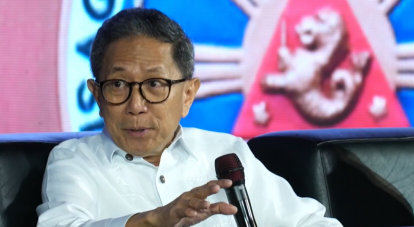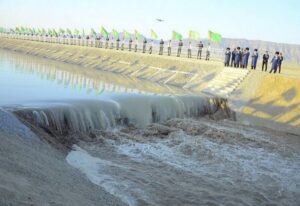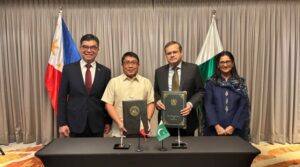DENR Ramps Up Efforts on Water Security, Flood Control, and Reforestation Amid President Marcos’ Call for Climate Resilience

Manila, The Gulf Observer: The Department of Environment and Natural Resources (DENR) is intensifying its efforts to address key environmental challenges, including water security, flooding, and deforestation, in alignment with President Ferdinand R. Marcos Jr.’s renewed call for a climate-resilient and sustainable future.
During the post-State of the Nation Address (SONA) conference on Tuesday, Environment Secretary Raphael Lotilla underscored the urgency of tackling water scarcity, citing government data that an estimated 40 million Filipinos still lack access to safe and clean water sources.
“This is a pressing challenge,” Secretary Lotilla admitted, “but the DENR, in coordination with other agencies, is actively pursuing solutions through various initiatives such as clean water systems, rainwater harvesting, reforestation, and hazard mapping.”
President Marcos, in his SONA, emphasized the importance of modern technology in water management, especially in providing potable water to remote and underserved communities. Lotilla revealed that six filtration and desalination systems were installed in 2024, with 28 more set to become operational by 2025.
“Our goal is to improve water services even in far-flung areas,” Lotilla explained. “Through filtration and desalination, even seawater can be made drinkable.”
Lotilla also highlighted the importance of rainwater catchment systems and supported the President’s call to institutionalize water storage as a standard feature in urban planning. He pointed to Bonifacio Global City (BGC) in Taguig City as a model, where underground cisterns have helped prevent flooding.
To support this initiative, DENR is working with the Department of Human Settlements and Urban Development (DHSUD) to develop policies that will incentivize or require subdivision and housing developers to include water cisterns in their plans.
“There are discussions underway with DHSUD Secretary Ping Aliling to formalize these requirements or incentives,” Lotilla said. “Cisterns can store water for use during difficult periods.”
He also noted that golf courses and other expansive land areas could serve as temporary water storage facilities, expanding the country’s capacity for water management.
Secretary Lotilla stressed that the Marcos administration is advocating a holistic approach—aligning flood control strategies with long-term water storage needs for agriculture, energy, and household use. He clarified that dams, while not primarily built for flood control, serve as crucial reservoirs for excess rainwater during dry seasons.
He also pointed to the Groundwater Atlas, a publicly accessible resource that maps the nation’s surface and underground water reserves, as a vital tool for communities and policymakers.
On reforestation, Lotilla reported an increase in forest cover and announced plans to double the national tree-planting target from 5 million to 10 million trees by 2028, through expanded partnerships with the private sector.
Addressing the recent series of floods and landslides caused by typhoons and monsoon rains, Lotilla urged local government units to utilize hazard mapping tools, particularly HazardHunterPH and the geo-hazard maps developed by the DENR’s Mines and Geosciences Bureau (MGB). He said the MGB now produces two- to three-day forecasts for landslide- and flood-prone areas using data from PAGASA to support disaster preparedness.
“We can’t prevent all disasters, but we can prepare,” Lotilla stated. “Even families must check whether their homes are in hazard zones.”
He further called on property developers and buyers to avoid constructing in high-risk areas and to consult DENR hazard data prior to land acquisition.
On the issue of solid waste, Lotilla pointed to clogged drainage systems as a major cause of flooding in Metro Manila, linking it to uncollected garbage. He stressed the need for regular pre-rainy season cleanup drives and called for stronger coordination with the Department of the Interior and Local Government (DILG) and the Metropolitan Manila Development Authority (MMDA).
“Preventing urban flooding starts with proper waste management,” Lotilla concluded, reaffirming the DENR’s commitment to climate action and environmental sustainability.


